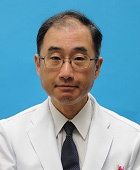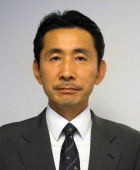Top > About Us > News Letter > Fostering World-leading Dermatologists in Clinical Care and Research
Fostering World-leading Dermatologists in Clinical Care and Research
From The University of Tokyo Hospital to the World
Department of Dermatology
Shinichi Sato, Professor and Chairman
The Department of Dermatology of the University of Tokyo Hospital upholds the goal of fostering world-leading dermatologists in both clinical care and research. The skin is the body’s largest organ, equipped not only with a barrier function to protect the body from the outer environment, but also with a metabolic function, immune function, and a range of other functions. Dermatology can therefore be described as an interdisciplinary science involving a vast spectrum of areas. At our department, we provide care to all patients with skin symptoms caused by diverse conditions including allergies, collagen disorders, skin tumors, infections, and congenital disorders. Treatments are all-encompassing, including dermatologic surgery and medical dermatology (e.g., for collagen disease), and involve diverse methods such as laser and ultraviolet irradiation and biologics. In addition to addressing general skin disorders, we also provide highly specialized outpatient clinics for scleroderma/connective tissue diseases, atopic dermatitis, psoriasis, bullous disease, and lymphoma as well as for patients who need dermatologic surgery and laser surgery, while engaging in basic research in the respective areas. In the next section, I would like to outline some of the specialized outpatient clinics we offer.
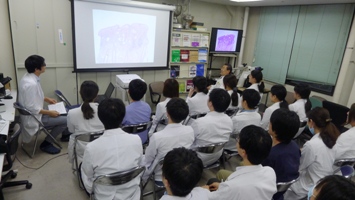
At a conference meeting
1: Outpatient clinic for scleroderma/connective tissue diseases
Classified as a collagen disease, systemic sclerosis (SSc) is characterized by cutaneous and visceral fibrosis and vascular disorder. There are believed to be over 30,000 SSc patients in Japan. Symptomatic therapy is currently the main treatment available for the disease, which is designated by the Ministry of Health, Labour and Welfare as one of the specified intractable diseases under subsidized research. Our department opened a specialized outpatient clinic for SSc patients in the 1980s, and has focused on clinical care for and research into the disease. The complicated cause of the disease is yet to be clarified, but it has been revealed that three kinds of abnormalities play key roles: (1) immune abnormalities (presence of autoantibody); (2) fibrosis (fibroblast activation); and (3) vascular disorders (e.g., Raynaud’s phenomenon, digital ulcers). We have shared our research findings with the global medical community by publishing numerous papers and making presentations at international conferences. We have also been proactively engaged in the development of new therapies, introducing and implementing clinical studies and trials on rituximab (anti-CD20 antibody), tocilizumab (anti-IL-6 receptor antibody), and brodalumab (anti-IL17RA antibody). In April 2018, the University of Tokyo Hospital became the first institution in Japan to establish a medical center dedicated to SSc patients. Named the SSc Center, the facility provides SSc patients with access to high-quality and intensive treatment across a range of departments offered by a multidisciplinary team of doctors.
2: Outpatient clinic for lymphoma
Our department offers an outpatient clinic for patients with cutaneous malignant lymphoma, a relatively rare disease with few specialists. Hospitals providing a specialized outpatient clinic for the disease are also scarce in Japan. Our lymphoma outpatient clinic, which also offers an online consultation service, draws patients from not only the Kanto region, but also from across the country. Broad treatment options are offered here, ranging from ultraviolet irradiation for mild cases to oral or intravenous administration of anticancer agents for severe cases. If necessary, we work in coordination with Radiology and Hematology to deliver radiation therapy and hematopoietic stem cell transplant, among other treatments. Moreover, our lymphoma outpatient clinic is part of an international consortium for cutaneous lymphoma, which is composed of scientific societies that have issued treatment guidelines for cutaneous malignant lymphomas, including the International Society for Cutaneous Lymphomas. This allows us to participate in global epidemiologic studies.
3: Outpatient clinic for psoriasis
Psoriasis is a common inflammatory skin disease presented as multiple erythematous plaques developing across the body. Psoriasis patients may also develop arthritis, uveitis, cardiovascular lesions, and glucose/lipid metabolism disorders, among others, which is why the disease is known to essentially require early treatment and lifestyle counseling. Recent studies have shown that psoriasis is among the diseases that most significantly impair patients’ quality of life, and this has prompted vigorous efforts to develop effective treatments. Such efforts have culminated in the development of new treatments in recent years, including biologics, namely anti-cytokine antibodies, and phosphodiesterase-4 (PDE4) inhibitors. However, given the increased treatment options now available, the method of treating the disease has become all the more complex, requiring us to select the most appropriate option for each patient in light of their symptoms and living environment. In response to such needs, our department established the Psoriasis Center, where we can provide treatments tailored to each patient based on our specialized knowledge.
4:Outpatient dermatologic surgery
The dermatologic surgery team takes care of skin diseases that require surgery, such as benign and malignant skin tumors and hidradenitis suppurativa. In consideration of each patient’s condition, the team makes efforts to explain to them their treatment options including non-surgical treatments in an easy-to-understand manner. Exponential progress has been made in the treatment of malignant skin tumors. We use immune checkpoint inhibitors including nivolumab, pembrolizumab, and ipilimumab for malignant melanoma patients, some of whom have experienced complete response to the drugs. Other advanced medical care we can offer includes the grafting of autologous cultured epidermis for extensive burns and exhaustive gene analysis using the Todai OncoPanel test. Furthermore, our department also conducts clinical studies on malignant skin tumors as a member of the skin tumor group of the Japan Clinical Oncology Group (JCOG).
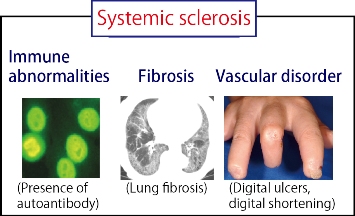
Pathological conditions of systemic sclerosis
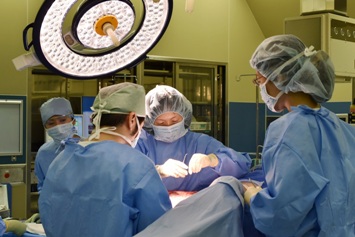
Dermatologic surgery team of our department
Departments/Divisions
Pediatrics, Children's Medical Center
Titles
M.D. , Ph.D.
Expertise/Specialties
Pediatrics, Child Neurology, Perinatal and Neonatal Medicine
Research Interests
1) Perinatal brain injury 2) Environmental effects of development
3) Congenital cytomegalovirus infection 4) Developmental disorders
5) Subacute Sclerosing Panencephalitis 6) Public health screening system
Languages
Japanese/ English
See More
Departments/Divisions
Urology and Andrology
Titles
M.D. , Ph.D.
Expertise/Specialties
Robotic Surgery, Laparoscopic Surgery, Endoscopic Surgery, Kidney Cancer, Urinary Tract Cancer, Bladder Cancer, Prostate Cancer, Testicular Cancer, Adrenal Tumor, Renal failure, Peritoneal Dialysis
Research Interests
Molecular Biology, Genome Research
Languages
See More
Departments/Divisions
Clinical Research Governance
Titles
Ph.D.
Expertise/Specialties
Clinical Reseach, GCP, regulation
Research Interests
Quality Management
Languages
Japanese / English
See More
Departments/Divisions
Department of Neurosurgery
Titles
M.D. , Ph.D.
Expertise/Specialties
Acoustic neuroma surgery, Arteriovenous malformation surgery, Skull base meningioma surgery, vertebrobasilar aneurysm surgery
Research Interests
Functional preservation of brain, brainstem and cranial nerves, surgical simulation with 3DCG, functional restoration by brain-machine interface (BMI), neural regeneration by recruitment of endogenous progenitors
Languages
Japanese/ English
See More
Departments/Divisions
Pharmaceutical Department
Titles
Ph.D.
Expertise/Specialties
pharmacy
Research Interests
clinical and molecular pharmacology / toxicology, and systems-biology / pharmacology / toxicology
Languages
Japanese / English
See More
Departments/Divisions
Department of Blood Transfusion
Titles
M.D., Ph.D.
Expertise/Specialties
Transfusion Medicine, Respiratory Medicine, Allergy and Clinical Immunology
Research Interests
Mechanism of transfusion complications, Haemovigilance
Languages
Japanese / English
See More
Departments/Divisions
Department of Pediatric Surgery
Titles
M.D. , Ph.D.
Expertise/Specialties
Pediatric Surgery, Pediatric Minimally Invasive Surgery, Pediatric Oncology, Pediatric Urology, Pediatric HBP Surgery
Research Interests
Pediatric Hepatobiliary disease, Pediatric MIS, Transplantation Immunology
Languages
Japanese/English
See More
Departments/Divisions
Central Supply Service
Titles
M.D. , Ph.D.
Expertise/Specialties
General Surgery, Operative Medicine, Nutrition Support
Research Interests
Surgical Nutrition and Metabolism, Gut Immunity
Languages
Japanese, English
See More
Departments/Divisions
Department of Gastroenterology; Department of Endoscopy and Endoscopic Surgery
Titles
M.D. , Ph.D.
Expertise/Specialties
Gastroenterology, Hepatology (Hepatitis, Hepatocellular Carcinoma), Pancreatology
Research Interests
Viral hepatitis, Hepatocarcinogenesis, NASH, Oxidative stress
Languages
Japanese / English
See More
Departments/Divisions
Allergy and Rheumatology
Titles
M.D. , Ph.D.
Expertise/Specialties
Rheumatology, Internal Medicine
Research Interests
Clinical Immunology, Basic Immunology
Languages
Japanese, English
See More
Departments/Divisions
Department of Psychosomatic Medicine
Titles
M.D. , Ph.D.
Expertise/Specialties
Psychosomatic Medicine
Research Interests
Research on development of treatment for eating disorders and on development of mobile tools for assessment and treatment for life-style related disorders and mood disorders using EMA and EMI methods.
Languages
Japanese / English
See More
Departments/Divisions
Neuropsychiatry, Medical Community Network and Discharge Planning
Titles
M.D. , Ph.D.
Expertise/Specialties
Clinical Psychiatry, Early intervention and rehabilitation for schizophrenia, Community mental health
Research Interests
Neuroimaging in psychiatric disorders, Mental health and neuroscience in adolescence
Languages
Japanese / English
See More
Departments/Divisions
Infection Control and Prevention Service/Department of Infection Control and Prevention Graduate School of Medicine
Titles
M.D. , Ph.D.
Expertise/Specialties
Infection Control and Prevention Service/ Hepatocellular carcinoma, Liver diseases, Viral hepatitis, Liver diseases
Research Interests
Mechanism of hepatocarcinogenesis and relarion between carcinogenesis and mitochondria damage
Languages
Japanese/English
See More
Departments/Divisions
Ophthalmology
Titles
M.D., Ph.D
Expertise/Specialties
Glaucoma, Neurobiochemistry, Ocular Pharmacology
Research Interests
・the analysis of the risk factor activating glaucoma
・the study of the surgical outcomes of glaucoma
・the elucidation to the pathology of increasing intraocular pressure through bioactive lipids
・the development of new drops for glaucoma
Languages
Japanese, English
See More
Departments/Divisions
Breast and Endocrine Surgery
Titles
M.D. , Ph.D.
Expertise/Specialties
surgery on primary breast cancer, systemic treatment on metastatic breast cancer
Research Interests
epigenetic change which is critical for breast cancer development, transcriptional regulation of estrogen receptor alpha (ERα)in breast cancer
Languages
Japanese/English
See More
Departments/Divisions
Division of Nephrology and Endocrinology, Department of Hemodialysis and Apheresis
Titles
M.D. , Ph.D.
Expertise/Specialties
Chronic kidney disease, Acute kidney injury, End stage kidney disesae, Hemodialysis, Nephrotic syndrome, Renal anemia, Atypical hemolytic uremic syndrome
Research Interests
Oxygen metabolism of the kidney, immunological kidney injury, epigenetics, renal anemia
Languages
Japanese/English
See More
Departments/Divisions
Department of Pain and Palliative Medicine
Titles
M.D. , Ph.D.
Expertise/Specialties
Pain Medicine, Palliative Medicine, Anesthesiology, Critical Care Medicine, Medical Engineering
Research Interests
Pain Medicine, Palliative Medicine, Cognitive Neuroscience, Health Literacy
Languages
Japanese
See More
Departments/Divisions
Geriatric Medicine
Titles
M.D. , Ph.D.
Expertise/Specialties
geriatric medicine, gerontology
Research Interests
Pharmacotherapy and its safety in the elderly. Gender difference in geriatric medicine.
Languages
Japanese, English
See More
Departments/Divisions
Department of Hematology and Oncology
Titles
M.D. , Ph.D.
Expertise/Specialties
Hematological malignancies
Research Interests
Leukemia
Languages
Japanese, English
See More
Departments/Divisions
Department of Cardiovascular Surgery & Department of Cooperative Unit of Medicine and Engineering Research
Titles
M.D. , Ph.D.
Expertise/Specialties
Adult Cardiac Surgery, Minimally Invasive Cardiac Surgery, Robotic Cardiac Surgery, Mitral Valve Plasty, Off-pump Coronary Artgery Bypass Surgery, Ventricular Assist Device, Heart Transplantation
Research Interests
Surgical Treatment of End-stage Heart Failure (Ventricular assist device, Heart transplantation, Mitral complex plasty), Device Development for Minimally Invasive Surgery, Regenerative Medicine
Languages
Japanese/English
See More
Departments/Divisions
Plastic Reconstructive and Aesthetic Surgery
Titles
M.D., Ph.D.
Expertise/Specialties
Reanimation of Established Facial paralysis, Reconstruction of Facial Deforimites, Wound Healing
Research Interests
Microsurgery, Facial Paralysis, Ageing
Languages
Japanese/English
See More
Departments/Divisions
Department of Acute Medicine
Critical Care and Emergency Medical Center/Emergency Room, Intensive Care Unit
Titles
M.D., Ph.D
Expertise/Specialties
emergency medicine, critical care medicine, intensive care medicine, disaster medicine, mass gathering medicine
Research Interests
acuity, triage, monitoring, emergency medical service system, disaster medical response system
Languages
English /Japanese
See More
Departments/Divisions
Department of Rehabilitation Medicine, Rehabilitation Center
Titles
M.D. , Ph.D.
Expertise/Specialties
Pediatric Rehabilitation, Rehabilitation and Prosthetics/Orthotics for Congenital Limb Malformation, Rehabilitation for Bone Dysplasias
Research Interests
Pediatric Rehabilitation, Rehabilitation for Disabled Children, Motion Analysis
Languages
Japanese / English
See More
Departments/Divisions
Center for Epidemiology and Preventive Medicine
Titles
M.D. , Ph.D.
Expertise/Specialties
Gastroenterology, Preventive Medicine
Research Interests
Oncology, Epigenetics, Molecular biology, Differentiation and Cancer
Languages
Japanese, English
See More
Departments/Divisions
Neurosurgery
Titles
M.D. , Ph.D.
Expertise/Specialties
Neurosurgery
Research Interests
Surgery of cerebrovascular diseases, Surgery of benign brain tumors, Experimental cerebral ischemia
Languages
Japanese/English
See More
Departments/Divisions
Department of Radiology
Division of Diagnostic Radiology
Titles
M.D., Ph.D
Expertise/Specialties
General diagnostic radiology, neuroradiology, interventional radiology
Research Interests
Voxel-based analysis, voxel-based morphometry, diffusion magnetic resonance imaging,
functional magnetic resonance imaging
Languages
Japanese/English
See More
Departments/Divisions
Stomach and Esophageal Surgery, Cancer Resource Center
Titles
M.D. , Ph.D.
Expertise/Specialties
Abdominal Surgery, General Surgery, Cancer Patients' Care
Research Interests
Gastric Carcinogenesis, Stem Cell and Carcinogenesis, Cancer Biomarker, Cancer Immunology, Growth Factor, Development
Languages
English, Japanese
See More
Departments/Divisions
Orthopaedic Surgery and Spinal Surgery
Titles
M.D. , Ph.D.
Expertise/Specialties
Joint surgery, rheumatoid arthritis, osteoporosis
Research Interests
Bone and cartilage biology, arthritis
Languages
Japanese, English
See More
Departments/Divisions
Dermatology
Titles
M.D. , Ph.D.
Expertise/Specialties
Scleroderma
Research Interests
Scleroderma, B lymphocytes, Autoimmunity
Languages
Japanese/English
See More
Departments/Divisions
Colorectal Surgery; Vascular Surgery
Titles
M.D., Ph.D
Expertise/Specialties
General Surgery, Gastrointestinal Surgery, Colorectal Surgery, Laparoscopic Surgery, Robotic Surgery, Minimally Invasive Surgery, Chemotherapy, Gastrointestinal Endoscopy, Colorectal Disease, Anorectal Disease, Colorectal Cancer, Inflammatory Bowel Disease, Diverticular Disease, Colorectal Polyp, Vascular Surgery, Abdominal Aortic Aneurysm, Thoracic Aortic Aneurysm, Endovascular Aneurysm Repair, Thoracic Endovascular Aortic Repair, Distal Bypass, Critical Limb Ischemia, Takayasu's Disease, Buerger Disease, Pancreatoduodeal Artery Aneurysm, Popliteal Entrapment Syndrome, Behçet's Disease, Carotid Endarterectomy, Hemodialysis, Peripheral Artery Aneurysm, Segmental Arterial Mediolysis, Deep Vein Thrombosis
Research Interests
Surgical Oncology, Vascular Surgery
Languages
Japanese/English
See More
Departments/Divisions
International Medical Center
University of Tokyo Tissue Bank
Artificial Organ and Transplantation Division, Department of Surgery
Titles
M.D., Ph.D., F.A.C.S.
Expertise/Specialties
Surgery, Heaptology, Liver Transplantation, Tissue Transplantation, Medical Education
Research Interests
Liver Disease, Liver Trasnplantation, Organ Transplantation, Donor Safety in Living Liver Donor, Tissue Transplantation, Tissue Banking, Cyropreservation of homograft, Medical Education, Surgical Training, Medical Care for Foreign Patients in Japan, Multicultural Resource for Health Care, Cross border clinical medicine
Languages
Japanese / English
See More
Departments/Divisions
Respiratory Medicine
Titles
M.D. , Ph.D.
Expertise/Specialties
Respiratory Medicine
Research Interests
The mechanism of respiratory diseases including COPD, asthma and pulmonary fibrosis
Languages
Japanese/English
See More
Departments/Divisions
University Hospital Medical Information Network Center Department of Heath Communication, School of Public Health, Faculty of Medicine, the University of Tokyo
Titles
M.D., Ph.D.
Expertise/Specialties
health communication, health informatics
Research Interests
Interpersonal and media-based health communication
Languages
Japanese/English
See More
Departments/Divisions
Department of Diabetes and Metabolic Diseases
Titles
M.D., Ph.D.
Expertise/Specialties
Diabetes, Metabolism, Obesity, Nutrition,
Research Interests
Pathogenesis of type2 diabetes, insulin resistance, adiponectin
Languages
Japanese / English
See More
Departments/Divisions
Clinical Research Support Center
Titles
M.D. , Ph.D.
Expertise/Specialties
Clinical Pharmacology, Neurology
Research Interests
Clinical Pharmacology, Neurology
Languages
Japanese, English
See More
Departments/Divisions
Otorhinolaryngology and Auditory and Voice Surgery
Titles
M.D. , Ph.D.
Expertise/Specialties
Otology, Audiology, Neurotology
Research Interests
Cochlear implant, hearing loss, regeneration, anti-aging
Languages
Japanese, English
See More
Departments/Divisions
Pathology
Titles
M.D. , Ph.D.
Expertise/Specialties
Gastrointestinal pathology
Research Interests
The pathology and molecular biology of gastrointestinal tumor
Languages
Japanese, English
See More
Departments/Divisions
Environment, Health and Safety Office
Titles
M.D., Ph.D.
Expertise/Specialties
Neurology
Research Interests
Clinical Neurology, Quality and Safety in Hospital Practice
Languages
Japanese, English
See More
Departments/Divisions
Obstetrics and Gynecology, Perinatal Center
Titles
M.D. , Ph.D.
Expertise/Specialties
Perinatal care for both normal and abnormal antepartum, labor, delivery, fetus and newborn, puerperium
Research Interests
Reproductive immunology / Perinatology / Reproductive Endocrinology
Languages
Japanese / English
See More
Departments/Divisions
Department of Diabetes and Metabolic Diseases
Titles
M.D. , Ph.D.
Expertise/Specialties
Internal Medicine, Diabetes, Metabolism, Nutrition, Obesity, Metabolic Syndrome, Diabetic Complications, Atherosclerosis, Insulin Resistance, Adipokines, Nuclear Receptors, Epigenetics, GWAS, Sportology, Anti-Aging Medicine
Research Interests
The mechanisms by which obesity results in insulin resistance, atherosclerosis and short life
Languages
Japanese / English
See More
Departments/Divisions
Stomach and Esophageal Surgery, Breast and Endocrine Surgery
Titles
M.D. , Ph.D.
Expertise/Specialties
Upper GI surgery, Esophageal Cancer, Gastric Cancer
Research Interests
surgical procedure and oncology of esophageal and gastric cancer
Languages
Japanese and English
See More
Departments/Divisions
Anesthesiology and Pain Relief Center
Titles
M.D. , Ph.D.
Expertise/Specialties
Anesthesiology, Critical care medicine, Respiratory care, Operative medicine, Pain medicine
Research Interests
Acute lung injury, Mechanical ventilation, acute inflammatory response, Mechanism of general anesthesia, Modulation of pain
Languages
Japanese/ English
See More
Departments/Divisions
Department of Child Psychiatry
Titles
M.D. , Ph.D.
Expertise/Specialties
Child and Adolescent Psychiatry, Tourette Syndrome and Other Tic Disorders, Obsessive-Compulsive Disorder (OCD), Attention-Deficit/Hyperactivity Disorder (ADHD), Autism Spectrum Disorder (ASD), School Mental Health
Research Interests
Phenomenology, Pathogenesis and Intervention of Tourette Syndrome and Comorbid Disorders Including OCD and ADHD
Languages
Japanese/English
See More
Departments/Divisions
Gynecologic Surgery
Titles
Professor
Expertise/Specialties
Reproductive medicine, laparoscopic surgery, assisted reproductive technology
Research Interests
Pathogenesis and management of endometriosis, Ovarian physiology/ pathology
Languages
Japanese / English
See More
Departments/Divisions
Department of Clinical Laboratory
Titles
M.D. , Ph.D.
Expertise/Specialties
Laboratory Medicine, Clinical Hematology, Thrombosis and Hemostasis
Research Interests
Platelet Biology, Vascular Biology, Bioactive Lipids
Languages
Japanese/ English
See More



